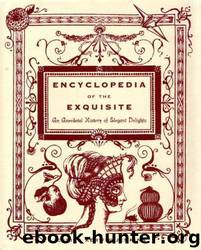Encyclopedia of the Exquisite: An Anecdotal History of Elegant Delights by Jessica Kerwin Jenkins

Author:Jessica Kerwin Jenkins [Jenkins, Jessica Kerwin]
Language: eng
Format: mobi, epub
ISBN: 9780385533652
Publisher: Nan A. Talese
Published: 2010-11-02T04:00:00+00:00
QABUS NAMA
An eleventh-century Islamic etiquette guide
Before chivalry brought them to their senses, Europe’s knights didn’t impress anyone. The twelfth-century Arab chronicler Ousâma watched horrified as Christian knights amused themselves by greasing an old woman’s pig and sending her to chase after it. But then, for generations the polite and cultured young men of Arabia had benefited from etiquette books that gathered together the wisdom of the ages, offering smart maxims and instruction on good manners. These helpful tomes, generally known as “Mirrors for Princes,” and including the celebrated eleventh-century manual Qabus Nama, or “Book of Good Counsel,” compiled everything a young noble would need to know in order to rule one day.
Early examples of the style emphasized old Bedouin virtues: bravery, honor, and jaw-dropping generosity. One popular anecdote told the story of the young poet Hatim al-Ta’i (d. 578), who slaughtered his family’s whole herd of camels in order to feed a party of strangers. When his father returned home, he anxiously asked his son what he’d done with the family fortune—the camels. “With them I have given you immortal glory,” Hatim replied coolly, “and honor that men will forever carry in verses in praise of us, in return for your camels.” Usually, however, such guides urged readers to decorous, moderate behavior, and instructed would-be rulers in remaining respectful and respectable. “Do not walk along showing an unseemly hilarity,” the Persian governor Tahir ibn al-Husain wrote in one ninth-century book. “Do not send away empty-handed a destitute beggar.”
The most famous and wide-ranging of such works was the Qabus Nama, written around 1082 by Kai Ka’us ibn Iskandar ibn Qabus ibn Washmgir for his favorite son and destined successor, Gilanshah. Kai Ka’us was an endearingly meticulous adviser whose counsel ranges from the parental to the strategic. Descended from a long line of dauntless warriors, he imparted down-to-earth advice informed by experience. His Qabus Nama included practical tips on buying real estate and on waging battle, but also offered a chapter on romantic love and another on sex, as well as those on table manners and on drinking wine. “I neither urge you to drink wine nor can I tell you not to drink, since young men never refrain from action at anyone’s bidding. Many persons spoke to me but I did not listen, until, when I was past fifty years of age,” Kai Ka’us wrote. Still, he told his son to open fine wines for his guests and hire “sweet-voiced and expert minstrels” to play at his banquets.
“If you drink wine, let it be the finest,” Kai Ka’us reasoned, “if you listen to music let it be the sweetest and if you commit a forbidden act, let it be with a beautiful partner, so that even though you may be convicted of sin in the next world, you will at any rate not be branded a fool in this.”
Download
Encyclopedia of the Exquisite: An Anecdotal History of Elegant Delights by Jessica Kerwin Jenkins.epub
This site does not store any files on its server. We only index and link to content provided by other sites. Please contact the content providers to delete copyright contents if any and email us, we'll remove relevant links or contents immediately.
Periodization Training for Sports by Tudor Bompa(8247)
The Body: A Guide for Occupants by Bill Bryson(5072)
The MacArthur Bible Commentary by John MacArthur(4816)
The Sports Rules Book by Human Kinetics(4377)
What It Really Takes to Get Into Ivy League and Other Highly Selective Colleges by Hughes Chuck(3741)
Marijuana Grower's Handbook by Ed Rosenthal(3668)
The Sprouting Book by Ann Wigmore(3582)
The Martian by Andy Weir(3401)
Salt, Fat, Acid, Heat: Mastering the Elements of Good Cooking by Nosrat Samin(3138)
The Bread Bible by Rose Levy Beranbaum(3064)
Sapiens and Homo Deus by Yuval Noah Harari(3057)
Harry Potter 4 - Harry Potter and The Goblet of Fire by J.K.Rowling(3054)
The Marketing Plan Handbook: Develop Big-Picture Marketing Plans for Pennies on the Dollar by Robert W. Bly(3041)
Classic by Mary Berry(3007)
Martha Stewart's Baking Handbook by Martha Stewart(2849)
Screenplay: The Foundations of Screenwriting by Syd Field(2627)
The Plant Paradox by Dr. Steven R. Gundry M.D(2599)
50 Economics Classics by Tom Butler-Bowdon(2566)
The Cambridge Grammar Of The English Language by Rodney Huddleston Geoffrey K. Pullum(2414)
